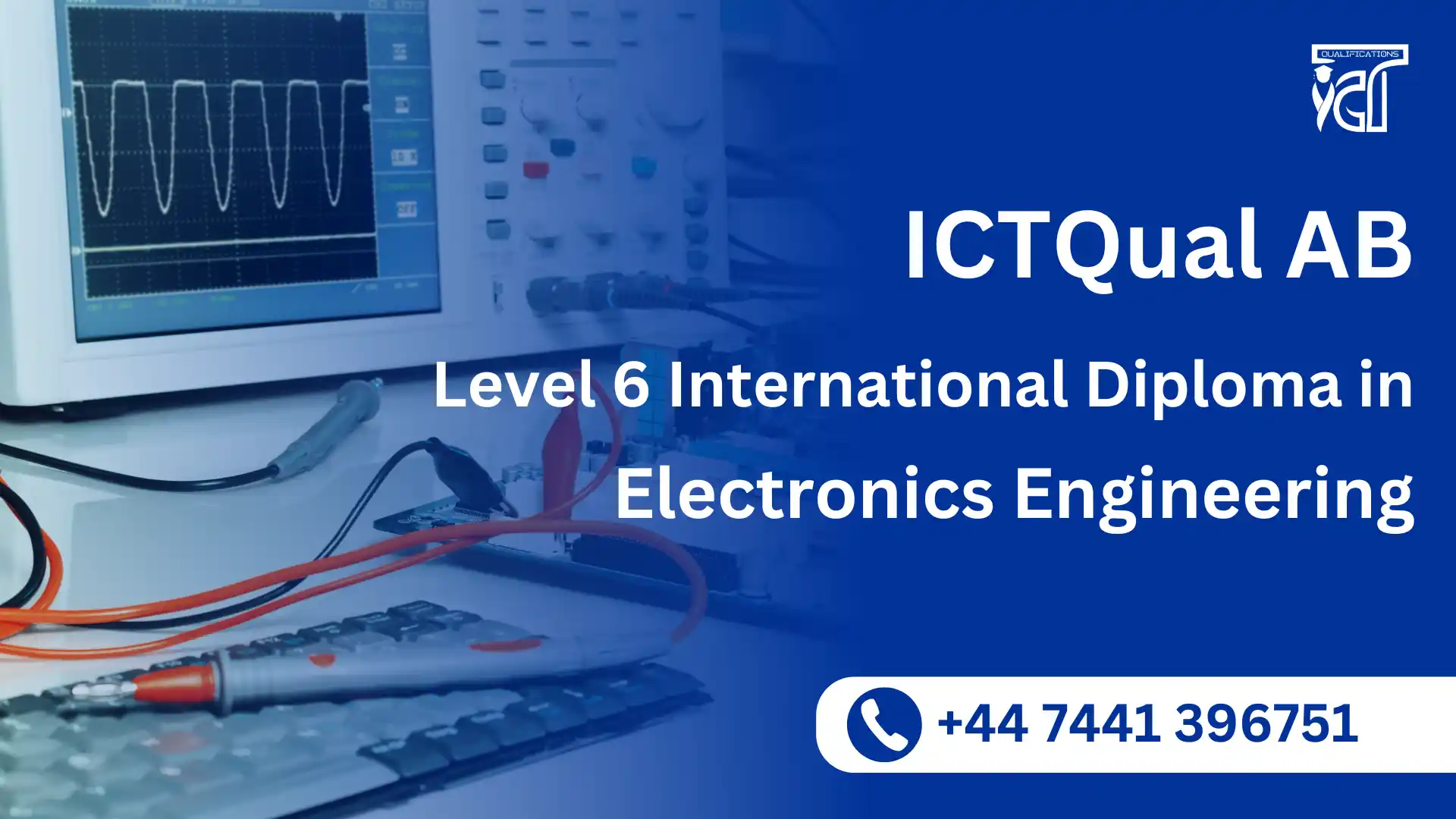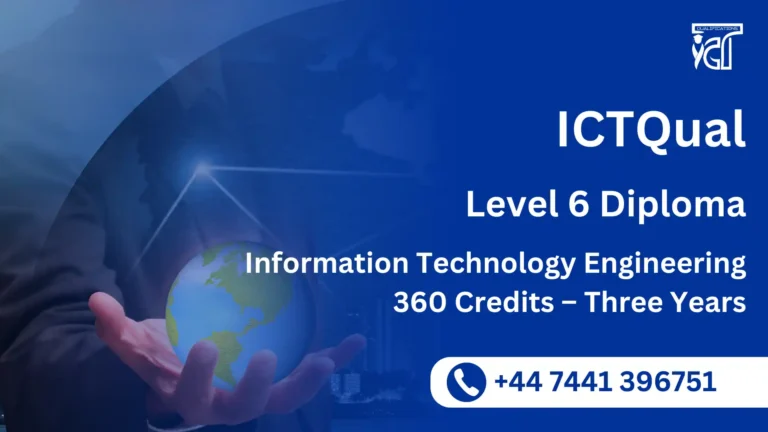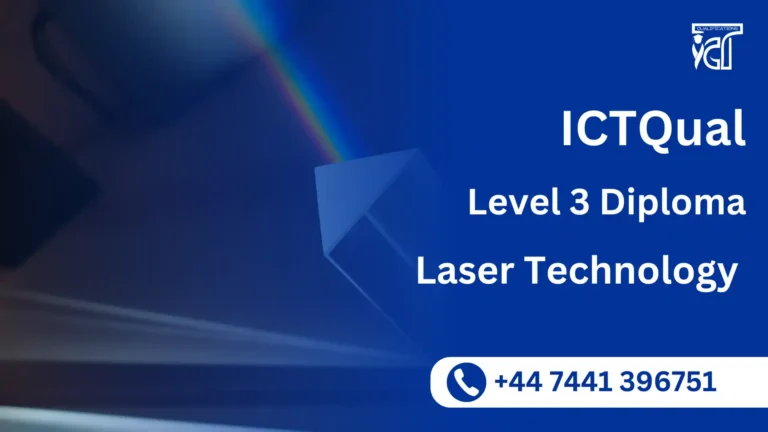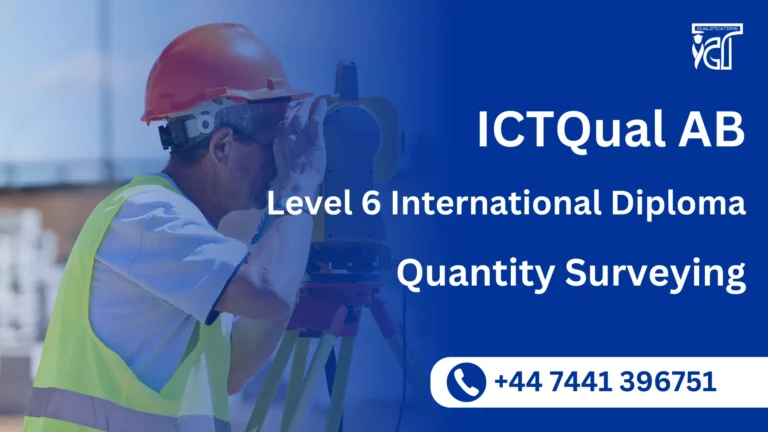The ICTQual AB Level 6 International Diploma in Electronics Engineering is a comprehensive and industry-focused programme designed to equip learners with advanced knowledge and practical skills in the rapidly evolving field of electronics. Spanning three years and comprising 360 credits, this Level 6 diploma integrates theoretical understanding with hands-on application, preparing learners to excel in modern electronic systems, circuit design, and digital technologies.
This internationally recognised qualification is suitable for both fresh learners beginning their careers in electronics and experienced professionals seeking to formalise or enhance their expertise. Learners will gain proficiency in digital and analog electronics, embedded systems, microcontrollers, circuit analysis, and electronic design automation, alongside essential skills in problem-solving, project management, and technical innovation. The programme emphasises practical application and analytical thinking, ensuring learners are prepared to tackle real-world challenges in electronics engineering and technology development.
Graduates of this diploma are well-positioned for a variety of rewarding career paths, including Electronics Engineer, Design Engineer, Embedded Systems Specialist, Project Engineer, or Technical Consultant. The course not only strengthens technical knowledge but also develops strategic planning, leadership, and project management skills, enabling learners to manage complex electronic projects efficiently. Completing this Level 6 internationally recognised qualification provides learners with long-term professional credibility, enhanced employability, and opportunities for advanced studies, empowering them to make a significant impact in the electronics and technology sectors worldwide.
ICTQual AB Level 6 International Diploma in Electronics Engineering
This qualification, the ICTQual AB Level 6 International Diploma in Electronics Engineering, consists of 36 mandatory units.
Year 1 – Foundation in Electronics Engineering
- Principles of Electrical and Electronics Engineering
- Introduction to Circuit Theory
- Digital and Analogue Electronics Fundamentals
- Electronic Components and Devices
- Fundamentals of Signal Processing
- Introduction to Microcontrollers and Embedded Systems
- Health, Safety, and Environmental Awareness
- Electrical Measurement and Instrumentation
- Laboratory Techniques in Electronics
- Technical Report Writing
- Introduction to Simulation and Design Software
- Basics of Power Electronics
Year 2 – Intermediate Electronics Engineering
- Advanced Circuit Design and Analysis
- Embedded System Programming
- Communication Systems Fundamentals
- Sensors, Transducers, and Instrumentation
- Power Electronics and Motor Control
- Microprocessor Architecture and Applications
- Process Control and Automation in Electronics
- Data Acquisition and Signal Conditioning
- Project Planning and Technical Communication
- Quality Control and Assurance in Electronics Systems
- Advanced Laboratory Techniques
- Electronics Standards, Safety, and Compliance
Year 3 – Advanced Electronics Engineering
- Advanced Embedded Systems and IoT Applications
- Robotics and Automation Systems
- Advanced Signal Processing Techniques
- Wireless and Telecommunication Systems
- Electronic System Design and Optimisation
- Power Systems and Renewable Integration
- Risk Assessment and Safety in Electronics Projects
- Advanced Laboratory Experiments and Testing
- Supply Chain and Logistics in Electronics Industry
- Capstone Project in Electronics Engineering
- Professional Development and Leadership in Engineering
- Strategic Decision-Making in Electronics Projects
Learning Outcomes for the ICTQual AB Level 6 International Diploma in Electronics Engineering:
Year 1 – Foundation in Electronics Engineering
Principles of Electrical and Electronics Engineering
- Understand the fundamentals of electrical and electronics engineering principles.
- Analyse electrical circuits, systems, and components.
- Apply theoretical knowledge to basic practical applications.
Introduction to Circuit Theory
- Comprehend series and parallel circuits, Ohm’s Law, and Kirchhoff’s Laws.
- Analyse and calculate circuit parameters such as voltage, current, and resistance.
- Apply circuit theory to real-world electronics problems.
Digital and Analogue Electronics Fundamentals
- Understand digital logic, binary systems, and analogue signal principles.
- Analyse the behaviour of digital and analogue circuits.
- Apply foundational concepts to design simple electronic circuits.
Electronic Components and Devices
- Identify and describe the function of resistors, capacitors, diodes, and transistors.
- Understand semiconductor device operation.
- Apply components effectively in circuit design.
Fundamentals of Signal Processing
- Learn basic signal types and processing techniques.
- Analyse time and frequency domain characteristics.
- Apply filtering and modulation principles to signals.
Introduction to Microcontrollers and Embedded Systems
- Understand microcontroller architecture and functionality.
- Program simple embedded systems.
- Implement basic interfacing and control applications.
Health, Safety, and Environmental Awareness
- Identify potential hazards in electronics labs and projects.
- Implement safety protocols and risk mitigation strategies.
- Promote environmentally responsible practices in electronics operations.
Electrical Measurement and Instrumentation
- Use measurement tools such as multimeters, oscilloscopes, and sensors.
- Analyse and interpret electrical data.
- Apply instrumentation techniques in practical experiments.
Laboratory Techniques in Electronics
- Conduct experiments to validate theoretical concepts.
- Collect and analyse experimental data for reporting.
- Develop problem-solving skills through practical applications.
Technical Report Writing
- Produce professional reports documenting experiments and projects.
- Present data, analysis, and conclusions clearly.
- Apply proper formatting, referencing, and technical writing conventions.
Introduction to Simulation and Design Software
- Gain basic proficiency in electronic simulation and design tools.
- Model circuits and systems to predict performance.
- Use software to support problem-solving and project development.
Basics of Power Electronics
- Understand the principles of power conversion and control.
- Analyse basic power electronic circuits such as rectifiers and inverters.
- Apply concepts to small-scale applications.
Year 2 – Intermediate Electronics Engineering
Advanced Circuit Design and Analysis
- Design and analyse complex analogue and digital circuits.
- Apply design methodologies to meet functional specifications.
- Evaluate circuit performance and reliability.
Embedded System Programming
- Program advanced microcontrollers and embedded platforms.
- Implement real-time control applications.
- Develop solutions for automation and IoT systems.
Communication Systems Fundamentals
- Understand principles of wired and wireless communication.
- Analyse modulation, transmission, and reception techniques.
- Apply concepts to basic communication system design.
Sensors, Transducers, and Instrumentation
- Understand types and applications of sensors and transducers.
- Implement instrumentation systems for monitoring and control.
- Analyse data from measurement devices for decision-making.
Power Electronics and Motor Control
- Analyse power electronic devices and circuits.
- Apply motor control techniques in practical applications.
- Optimise energy efficiency in motor-driven systems.
Microprocessor Architecture and Applications
- Understand microprocessor operation and architecture.
- Implement software to control microprocessor-based systems.
- Design small-scale projects integrating microprocessor functions.
Process Control and Automation in Electronics
- Apply control theory to electronics and automation systems.
- Implement feedback and control mechanisms.
- Analyse system stability and performance.
Data Acquisition and Signal Conditioning
- Use sensors and devices for data collection.
- Implement signal conditioning techniques to improve data quality.
- Analyse and interpret collected data for practical applications.
Project Planning and Technical Communication
- Develop skills for planning and managing electronics projects.
- Communicate technical information effectively.
- Apply project management techniques to ensure successful outcomes.
Quality Control and Assurance in Electronics Systems
- Implement quality assurance practices in electronics design and production.
- Monitor compliance with technical and safety standards.
- Conduct inspections and testing for system reliability.
Advanced Laboratory Techniques
- Perform more complex experiments in electronics and instrumentation.
- Collect, analyse, and interpret experimental data.
- Apply laboratory results to improve design and operations.
Electronics Standards, Safety, and Compliance
- Understand industry standards and regulatory requirements.
- Ensure electronic systems comply with safety and performance standards.
- Implement best practices for safe and compliant operations.
Year 3 – Advanced Electronics Engineering
Advanced Embedded Systems and IoT Applications
- Design and implement complex embedded systems for IoT applications.
- Integrate sensors, actuators, and communication modules.
- Analyse system performance and reliability.
Robotics and Automation Systems
- Understand robotic systems design and automation principles.
- Implement control algorithms for robotic applications.
- Apply electronics engineering skills to automation projects.
Advanced Signal Processing Techniques
- Analyse and process complex analogue and digital signals.
- Apply filtering, modulation, and coding techniques.
- Implement signal processing solutions for real-world applications.
Wireless and Telecommunication Systems
- Understand wireless communication principles and protocols.
- Design and analyse telecommunication systems.
- Apply RF, microwave, and networking concepts in projects.
Electronic System Design and Optimisation
- Develop complete electronic systems from concept to implementation.
- Optimise design for performance, efficiency, and cost.
- Conduct system testing and troubleshooting.
Power Systems and Renewable Integration
- Analyse electrical power systems and renewable energy integration.
- Implement strategies for energy efficiency and sustainability.
- Optimise system performance and reliability.
Risk Assessment and Safety in Electronics Projects
- Identify risks in complex electronics projects.
- Implement mitigation strategies to ensure safety and compliance.
- Monitor projects to maintain high safety standards.
Advanced Laboratory Experiments and Testing
- Conduct advanced experiments to validate complex systems.
- Analyse results for design optimisation.
- Apply experimental findings to operational solutions.
Supply Chain and Logistics in Electronics Industry
- Understand procurement, production, and distribution in electronics manufacturing.
- Optimise supply chain efficiency and reliability.
- Integrate logistics planning with project and system management.
Capstone Project in Electronics Engineering
- Undertake a comprehensive project integrating knowledge from all units.
- Solve real-world electronics engineering challenges.
- Present findings, recommendations, and solutions professionally.
Professional Development and Leadership in Engineering
- Develop leadership, teamwork, and strategic decision-making skills.
- Enhance professional communication and project oversight capabilities.
- Prepare for senior operational, managerial, or consultancy roles.
Strategic Decision-Making in Electronics Projects
- Apply analytical frameworks for informed engineering decisions.
- Consider technical, financial, and operational factors in strategy.
- Implement long-term initiatives for sustainable and efficient electronics systems.
The ICTQual AB Level 6 International Diploma in Electronics Engineering equips learners with advanced technical, analytical, and project management skills needed to excel in the electronics and technology sector. Graduates gain the knowledge and practical experience to design, develop, and maintain complex electronic systems.
1. Advanced Technical Knowledge
- Master digital and analog electronics, embedded systems, and microcontrollers.
- Gain expertise in circuit analysis, electronic design automation, and system troubleshooting.
- Understand communication systems, sensors, and control systems.
- Develop skills in power electronics, instrumentation, and automation technologies.
- Apply theoretical concepts to real-world electronic projects.
2. Career Advancement Opportunities
- Prepare for roles such as Electronics Engineer, Design Engineer, Embedded Systems Specialist, Project Engineer, or Technical Consultant.
- Enhance employability in electronics, automation, telecommunications, and manufacturing sectors.
- Strengthen practical skills for system design, project implementation, and technical leadership.
- Build competencies for managerial or specialist roles.
- Access global career opportunities in electronics engineering and technology development.
3. Professional Development and Recognition
- Earn a Level 6 internationally recognised diploma.
- Formalise prior experience for professionals seeking recognition.
- Develop leadership, strategic planning, and project management skills.
- Gain confidence in designing and managing electronic projects.
- Establish a foundation for continuous professional growth.
4. Practical and Industry-Focused Skills
- Apply knowledge to develop, test, and maintain electronic systems.
- Strengthen problem-solving, analytical, and decision-making skills.
- Gain experience in simulation software, circuit prototyping, and embedded systems programming.
- Build teamwork and communication skills for technical project collaboration.
- Prepare for real-world challenges in electronics engineering.
5. Long-Term Benefits
- Enhanced employability and career progression in electronics and technology roles.
- Access to advanced studies, certifications, and specialist pathways.
- Contribute to technological innovation and system optimisation.
- Build professional credibility and technical mastery.
- Prepare for leadership positions in electronics projects and technology organisations.
The programme is designed for learners who want to build expertise in electronics engineering, whether they are starting their career or enhancing professional experience.
1. Fresh Learners
- Recent graduates in electronics, electrical engineering, or related fields.
- Individuals starting a career in electronics engineering, design, or embedded systems.
- Learners aiming to gain an internationally recognised qualification.
- Those seeking practical and technical skills for real-world applications.
- Individuals motivated to contribute to innovative electronics and technology projects.
2. Experienced Professionals
- Professionals seeking to formalise their electronics engineering experience.
- Individuals aiming for managerial, specialist, or leadership roles.
- Learners wanting to advance knowledge in circuit design, embedded systems, and electronics project management.
- Those seeking international recognition and career growth.
- Professionals preparing for advanced technical or leadership roles.
Completing the Level 6 International Diploma in Electronics Engineering opens pathways for both academic advancement and career growth.
1. Academic Progression
- Progress to Level 7 Diplomas in Electronics Engineering, Embedded Systems, or Automation.
- Enrol in Master’s programmes in Electrical Engineering, Electronics, or Embedded Systems.
- Access specialist certifications in embedded systems, automation, or control systems.
- Build a foundation for research or advanced professional studies.
- Prepare for continuous professional development and lifelong learning.
2. Career Advancement
- Opportunities as Electronics Engineer, Design Engineer, Project Engineer, Embedded Systems Specialist, or Technical Consultant.
- Work in electronics, automation, telecommunications, and manufacturing industries.
- Manage technical projects, embedded systems implementations, and electronics design.
- Prepare for senior, managerial, or specialist roles.
- Enhance international employability and professional credibility.
As an approved ICTQual AB centre, we provide two pathways for learners:
Route 1: Experienced Professionals
- Designed for learners with at least six years of verifiable experience in electronics engineering or related sectors.
- Recognises prior expertise and allows faster diploma completion.
- Focuses on advanced modules, strategic projects, and applied learning.
- Ideal for professionals seeking managerial, specialist, or leadership roles.
Route 2: Fresh Learners
- For learners new to electronics engineering.
- Requires completion of 36 structured assignments covering all core units.
- Emphasises hands-on skills, analytical thinking, and practical application.
- Provides a solid foundation to progress into specialist roles, managerial positions, or advanced studies.
Entry Requirements
Minimum Age
- Learners must be 18 years or older at enrolment.
Educational Background
- Level 5 Diploma or equivalent in electronics, electrical engineering, or related technical fields.
- Understanding of mathematics, physics, and electronic principles is recommended.
Professional Experience
- Route 1: Minimum six years of verifiable professional experience in electronics engineering or related sectors.
- Route 2: Fresh learners must complete 36 structured assignments.
Language Proficiency
- Competence in English (written and spoken).
- Recommended: IELTS 5.5 or equivalent for non-native speakers.
Additional Skills
- Basic computer literacy for online learning and assignment submission.
- Commitment to practical application and professional growth.
- Ability to work independently and collaboratively on technical projects.
Register Now
Qualification Process
Qualification Process for the ICTQual AB Level 6 International Diploma in Electronics Engineering
- Self-Assessment:
Begin by evaluating your eligibility to ensure you meet the qualification requirements, including work experience, knowledge, and language proficiency. - Registration:
Complete your registration by submitting the required documents, including a scanned copy of a valid ID, and paying the registration fee. - Induction:
An assessor will conduct an induction to confirm your eligibility for the course and explain the evidence requirements. If you do not meet the criteria, your registration will be cancelled, and the fee will be refunded. - Assignments & Evidence Submission:
Provide all assignments and the necessary evidence based on the assessment criteria outlined in the course. If you are unsure of the required evidence, consult with the assessor for guidance on the type and nature of evidence needed. - Feedback and Revision:
The assessor will review your submitted evidence and provide feedback. Evidence that meets the criteria will be marked as “Criteria Met,” while any gaps will be identified. You will be asked to revise and resubmit if needed. - Competence Evidence:
Submit final evidence demonstrating that all learning outcomes have been met. This evidence will be marked as “Criteria Met” by the assessor once it is satisfactory. - Internal Quality Assurance (IQA):
The Internal Quality Assurance Verifier (IQA) will review your evidence to ensure consistency, quality, and compliance with standards. - External Verification:
The IQA will submit your portfolio to ICTQUAL AB External Quality Assurance Verifiers (EQA) for final confirmation. The EQA may contact you directly to verify the authenticity of your evidence. - Certification:
Upon successful completion of all checks, ICTQUAL AB will issue your official certificate, confirming that you have attained the ICTQual AB Level 6 International Diploma in Electronics Engineering.







